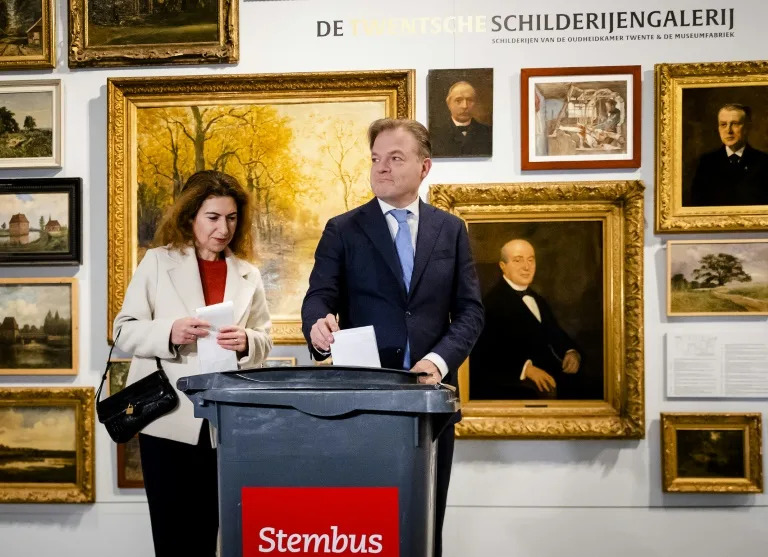Here's what happens next after (FASCIST) Wilders' PVV (Freedom Party) won 35 seats in parliament ahead of the centre-right on 23 and left wing parties 26 seats, according to exit polls.
Richard CARTER
Wed, 22 November 2023

The voting is just the start (Sem van der Wal)
Geert Wilders' far-right party has won most seats in the Netherlands' election, according to exit polls, but the country's fragmented political system means months of talking will be needed before the next government is formed.
Here's what happens next after Wilders' PVV (Freedom Party) won 35 seats in parliament ahead of the centre-right on 23 and left wing parties 26 seats, according to exit polls.
- 'Complex and exciting' negotiations -
76 is the magic number. That's how many seats in the 150-seat parliament any coalition needs to govern.
As soon as the final results are in, the calculators will be coming out to see what combination of the many competing parties can get to that number.
The new House of Representatives meets to begin the business of forming a cabinet -- "a complex and exciting process", as the parliament's own website describes it.
First, political parties appoint a "scout" to kick off initial talks.
Then parliament appoints an "informateur" to scope out the possible contours of a coalition agreement. Before 2012, this person was appointed by the monarch.
When it looks like a group of parties can work together, in comes a "formateur", who is almost always the person who won the election. That person starts the sensitive work of building a potential cabinet.
If all is agreed, the parties sign a coalition agreement and the new government sets out its plans in parliament, followed by a vote of confidence.
- How long does this take? -
Ages. Parties compete to get as much of their manifesto into the coalition agreement as possible, and that's even before the jockeying for ministerial jobs.
The last government of Prime Minister Mark Rutte took a record 271 days to form. It could take even longer this time.
"Amid high fragmentation, government formation remains almost even more important than the exact election result," said Herman Betten from the Teneo Research Group.
Most analysts do not expect a government to be formed before mid-2024.
- Who's in charge then? -
Until a new government is officially sworn in, the outgoing cabinet and prime minister run the country, in this case Mark Rutte.
Rutte prompted the early elections when his cabinet collapsed over immigration policy and he announced he was leaving national politics.
Things tend to run pretty smoothly in the interim period. This is a tried-and-tested process, as never in Dutch history has one party gained more than 50 percent of the vote.
- How stable are coalitions? -
The problem with the system is that with such slim majorities in parliament, a coalition is always at the mercy of a smaller party withdrawing support.
Already coalitions must incorporate a wide range of viewpoints from parties that are often relatively far apart politically and which have been attacking each other during the campaign.
Rutte's last coalition was especially fragile and ultimately fell apart over "irreconcilable differences" on immigration.
- What next for Rutte? -
Best-known internationally for cycling to work, sometimes munching an apple along the way, Rutte was a strong voice in Europe, sometimes irking his southern colleagues with his focus on fiscal discipline.
Speculation is rife he wants to become the new secretary-general of the NATO alliance when Jens Stoltenberg steps down.
Rutte has played down the idea, although admitting it would be an "interesting role". He said he believes the post should go to a woman.
ric/tw
No comments:
Post a Comment